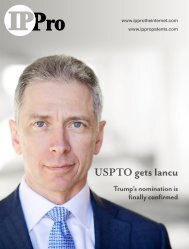IPPro Issue 002
IPPro is the go-to industry publication for news, views, and opinion on patent practice, law and management. The fortnightly publication and accompanying website - the only free-to-read intellectual property resource around - cover the full spectrum of IP law globally, including prosecution, litigation, licensing, management and technology.
IPPro is the go-to industry publication for news, views, and opinion on patent practice, law and management. The fortnightly publication and accompanying website - the only free-to-read intellectual property resource around - cover the full spectrum of IP law globally, including prosecution, litigation, licensing, management and technology.
Create successful ePaper yourself
Turn your PDF publications into a flip-book with our unique Google optimized e-Paper software.
SEP Debate<br />
Standard setters<br />
IP Europe brings its own arguments to bear as Europe’s SEP debate continues<br />
Barney Dixon reports<br />
Despite appearing to cool down, Europe’s standard-essential patent<br />
war continues to boil. The debate has temporarily shifted from a<br />
regulatory setting, to a competition between two competing best<br />
practice workshops on standards licensing.<br />
IP Europe, an organisation representing research and development<br />
intensive wireless technology developers in Europe—both small- and<br />
medium-sized enterprises (SMEs) and larger corporations such as<br />
Ericsson, Nokia and Orange—now shares its frustration within this<br />
context, arguing that Silicon Valley giants are hijacking its attempts to<br />
maintain fair, reasonable and non-discriminatory (FRAND) outcomes<br />
to licensing negotiations.<br />
Francisco Mingorance, executive secretary of IP Europe, says<br />
that despite these frustrations, there are early signs that the recent<br />
European Commission Communication on SEP licensing has improved<br />
outcomes in the market. We spoke to Mingorance to find out more.<br />
What is the difference between IP Europe’s CEN/CENELEC<br />
workshop and other workshops aimed at SEPs in Europe?<br />
We launched our CEN/CENELEC workshop initiative, the ‘Best<br />
Practices and a Code of Conduct for Licensing Industry Standard<br />
Essential Patents in the Internet of Things (IoT) / Industrial Internet’,<br />
last October, to document the best practices used over the last 15 to<br />
20 years in licensing standardised technology.<br />
We want this exercise to support constructive working relationships<br />
between standards developers and implementers as we make the<br />
transition into the internet of things and 5G environment.<br />
An additional goal of this exercise is to help inform the many SMEs<br />
who, attracted by the market potential of the Internet of Things, will<br />
be entering the standards environment for the first time. They need to<br />
be well informed about the legal and financial obligations of licensing<br />
and using the open wireless technology standards.<br />
On the other hand, a group of Silicon Valley giants, who initially<br />
attempted to hijack our workshop before leaving with copies<br />
of our documentation, have established a parallel workshop,<br />
titled ‘Industry Best Practices and an Industry Code of Conduct<br />
for Licensing of Standard Essential Patents in the field of 5G<br />
and Internet of Things’, aimed at rewriting 20 years of licensing<br />
practices to their specifications. Sadly, this is part of an ongoing<br />
pattern of behaviour from a few companies that are trying to<br />
diminish and undercut the value of innovative open wireless<br />
technology standards like 4G and 5G.<br />
We are trying to develop and document existing best practices, they<br />
are attempting to squeeze the returns, and ultimately the sustainability,<br />
of European innovators like Ericsson, Nokia and Orange, which are<br />
investing heavily in developing revolutionary technology for inclusion<br />
in open standards. Unfortunately, despite these significant differences,<br />
the title of the opposing workshop is confusing some organisations.<br />
What is at the root of these different approaches?<br />
The sole focus of this group of Silicon Valley giants is to try to<br />
undermine the tried-and-tested licensing valuation model by putting<br />
forward new ways of calculating royalties based on the fraction of<br />
the value of a microchip. Unfortunately, we have seen this behaviour<br />
repeatedly: for example, in their hijack of the intellectual property<br />
Rights policy at the Institute of Electrical and Electronics Engineers<br />
Standards Association (which is now being investigated by the US<br />
Department of Justice), and their unsuccessful lobbying around the<br />
European Commission’s Communication on SEP licensing.<br />
None of these companies has ever produced or licensed any cellular<br />
technology, but they benefit greatly from being able to implement<br />
open standard technologies in their products.<br />
If you reduce the licence fees by a factor of 30 or more, which is what<br />
these companies are proposing, then there is no longer an incentive<br />
for companies and universities to contribute IP to open standards.<br />
There would be no more investment in open standards, only private<br />
technology held privately by companies and that is the end of it.<br />
They need to recognise that if there is no remuneration, there will be<br />
no more innovation in open standards to support the development of<br />
their businesses. In this instance, wireless innovators would be forced<br />
to sell their innovations to private buyers, leading to a fragmented<br />
marketplace of competing wireless technologies and a decline in<br />
interoperability. But perhaps this is what they want.<br />
What does IP Europe hope to achieve from its second CEN/<br />
CENELEC workshop?<br />
We are trying to educate tech users who are new to this field. In the past<br />
there have always been limited players in the telecoms market: everyone<br />
knows each other and they all know the rules of the game. Now, we are<br />
talking of bringing in new sectors, like the automotive industry, or the<br />
health sector or energy sector, transportation, you name it.<br />
Companies in these new sectors will start using the internet of things<br />
and 5G technology in completely new ways and most of them don’t<br />
yet fully understand how these new specifications will work. What<br />
we’re trying to do is document and explain how it works and how<br />
it can be used to the mutual advantage of both those who use the<br />
technology and those who develop it.<br />
Sometimes with the internet of things, you will have small companies<br />
that will also develop the wireless technologies and will want to license<br />
it out. As such, it is also important for them to be able to operate in<br />
a stable and predictable IP licensing environment, rather than one in<br />
which they may be forced to find expensive legal remedies, just in<br />
order to receive payment for their inventions.<br />
We want to document the best practices and promote what we call<br />
good behaviour in licensing negotiations between patent holders<br />
and the licensee (not just from one perspective) and to promote<br />
the behaviours that prevent litigation by making more information<br />
available and explaining how licensing works. Then eventually we<br />
want to encourage more investment in 5G and to improve technology<br />
standards for small and large companies, as opposed to undermining<br />
any fair and reasonable expectation of returns.<br />
Were you pleased with the European Commission’s communication<br />
on SEPs? Could they have gone further?<br />
We were happy with the communication, but it could have been even<br />
better. Both the communication and the conclusions of the European<br />
Council supported the tried-and-tested principle of access to all in<br />
licensing negotiations, which was our primary goal. The alternative<br />
license to all approach, being advocated for by the Silicon Valley<br />
cabal, would have obligated our members to provide licenses for the<br />
technology to every single member of product value chain that requested<br />
one. This was seen as another attempt to force us to license our world<br />
changing innovations at the fraction of the value of a chip. However,<br />
when judging success, it is important to remember that the political and<br />
legal wrangling can only be viewed as beneficial if it helps create a more<br />
positive market dynamic, and I’m pleased to say that has been the case.<br />
It was felt by some of our members that in the build up to the<br />
communication that a number of negotiations had stalled as<br />
implementers were questioning whether the outcome of the<br />
communication may offer them a chance to renegotiate. However,<br />
two days following the decision BMW became the first automotive<br />
manufacturer to agree a licensing deal for using the 2G, 3G and 4G<br />
patented technologies in the AVANCI patent pool.<br />
That is the really great news, because despite the talk of industry<br />
winners or losers, standardisation is, at its heart, an exercise in<br />
balance and collaborative innovation that is intended to make<br />
sure consumers can benefit from shared access to the best<br />
technologies globally.<br />
Is the debate going the way you’d hoped?<br />
Despite this positive trend though, it<br />
remains a great shame that this ongoing<br />
campaign to undermine open standards<br />
continues to distract energy and<br />
resources away from development and<br />
commercialisation of these revolutionary<br />
open technology standards<br />
Gradually, yes. I think there is a growing appreciation in the US<br />
particularly, but also in Europe, that some of the more outlandish<br />
positions and actions taken by opponents of the IP rights have<br />
been potentially damaging to a very important and advanced area<br />
of innovation.<br />
Despite this positive trend though, it remains a great shame that<br />
this ongoing campaign to undermine open standards continues<br />
to distract energy and resources away from development and<br />
commercialisation of these revolutionary open technology<br />
standards; especially, when we are just about to see again the huge<br />
benefits the system brings, in the shape of the first full technical<br />
specification for 5G. <strong>IPPro</strong><br />
Francisco Mingorance, executive secretary, IP Europe<br />
32 <strong>IPPro</strong> The Internet www.ipprotheinternet.com 33





